This article was co-authored by Marsha Durkin, RN. Marsha Durkin is a Registered Nurse and Laboratory Information Specialist for Mercy Hospital and Medical Center in Illinois. She received her Associates Degree in Nursing from Olney Central College in 1987.
There are 8 references cited in this article, which can be found at the bottom of the page.
wikiHow marks an article as reader-approved once it receives enough positive feedback. In this case, 92% of readers who voted found the article helpful, earning it our reader-approved status.
This article has been viewed 221,681 times.
Alkaline phosphatase (ALP) is an enzyme naturally found in your liver, digestive system, kidney, and bones. A high ALP may indicate health conditions including liver damage, liver disease, bone disease, or a blocked bile duct. In most instances, high ALP is a temporary and non-serious concern. Children and teenagers, in particular, may have a higher ALP than adults. ALP rates can be lowered through a combination of medication, dietary changes, and lifestyle modifications. Talk to your doctor about whether further testing is needed.[1]
Steps
Managing Medications and Health Conditions
-
1Control the disease or condition which is causing your high ALP. ALP is typically the symptom of a different health condition. So, to reduce your ALP, you’ll need to control the underlying condition. High ALP can be caused by conditions as varied as a vitamin D deficiency and bone disorders.[2]
- For example, if your doctor figures out that your high ALP rates are being caused by liver disease, they’ll prescribe you a medication to deal with the liver disease. The high ALP will normalize on its own after the liver disease has been dealt with.
-
2Figure out if medications are causing high levels of ALP. Certain prescription medications have a side effect of raising ALP levels. Your doctor will likely ask you to stop taking one or more of these medications for a pre-determined amount of time (e.g., a week), and then to come back to the office for another blood test. If your ALP levels have not decreased, you may need to take a week off from a different medication, to see if that has an effect on your ALP. Medications that can lead to high ALP levels include:[3]
- Birth control pills and hormonal drugs.
- Antidepressants and anti-inflammatory medicines.
- Various steroids and narcotics.
Advertisement -
3Stop or switch out medications as necessary. In some cases, you may not be able to safely stop taking a prescription medication altogether. If you and your doctor have determined that a specific medication is giving you high ALP, work with your doctor to find an effective replacement medication. Many prescription medications will require you to slowly reduce your dosage over time. Stopping cold-turkey may result in unpleasant side effects.
- For example, if your current antidepressant is raising your ALP levels, ask your doctor if they can write you a prescription for a different antidepressant.
- On the other hand, your doctor will probably recommend that you stop using steroids and narcotics altogether. If you’re taking these products for pain management, ask your doctor to recommend a safe alternative that will not impact your ALP levels.
- Whether you’re stopping medications temporarily or permanently, be sure to only do so under a doctor’s supervision.
Treating High ALP through Dietary and Lifestyle Changes
-
1Eliminate foods high in zinc from your diet. Zinc is a structural element of the ALP enzyme. Consequently, cutting out zinc-high foods from your diet will automatically decrease the amount of ALP in your body. Read the “Ingredients” list on a food product if you’re not sure how much zinc it contains. Foods that contain large amounts of zinc include:[4]
- Lamb and mutton.
- Beef and pumpkin seeds.
- Oysters and spinach.
- Adult women should avoid consuming more than 8 milligrams (0.0080 g) of zinc daily, and Adult men should avoid consuming more than 11 milligrams (0.011 g).[5]
-
2Eat foods that are high in copper. Copper is important in regulating the body’s enzyme levels, and has been shown to help decrease high levels of ALP. Foods that are rich in copper include:[6]
- Sunflower seeds and almonds.
- Lentils and asparagus.
- Dried apricots and dark chocolate.
- Adults over 19 years of age should avoid consuming more than 900mcg of copper daily.[7]
-
3Incorporate foods that will help control enzyme levels. Certain types of food will encourage a healthy ALP level in your body. Speak to your doctor if you have any dietary concerns or restrictions, or would like more information about which foods can help moderate ALP levels in your body. Eat foods that will help regulate your body’s enzyme levels and that contain low levels of ALP. These include:[8]
- Dairy products like milk, eggs, yogurt, and cheese.
- Fish like herring, tuna, and mackerel.
- Alfalfa and mushrooms.
-
4Increase your exposure to the sun. Since vitamin D deficiency is one of the most common causes of high ALP, your doctor will likely ask you to find a way to raise your vitamin D levels. When your skin comes into contact with sunlight, your body produces vitamin D. Try to spend at least 20 minutes in the sun on a daily basis to help lower your ALP.[9]
- This could mean taking bi-weekly trips to the swimming pool, or sunning yourself on the beach or your lawn. Or, wear short sleeves and take a 30-minute walk when the sun is shining.
- It’s always a good idea to wear sunscreen when spending time in direct sunlight. The sunscreen will not interfere with the amount of vitamin D that your body produces.
- If you live in an area where it’s inconvenient to receive direct sun exposure (or if it’s winter), your doctor may suggest that you take vitamin D capsules.
-
5Incorporate an exercise routine into your weekly agenda. Living a healthy lifestyle, including regular exercise or work-outs, will help prevent or diminish the type of health conditions that will give rise to high ALP.[10]
- You can start exercising by taking a 30-minute walk or jog each day. Also consider joining a local gym, or finding a nearby spin or yoga class to take.
- Conditions that lead to high ALP and can be improved through exercise include a fatty liver and conditions related to liver inflammation and bile blockage.
-
6Tailor your exercise program to fit your physical abilities. For many people with high ALP, the condition is caused by a serious illness like diabetes, heart or bone disease, or hypertension. People with these conditions may not be physically able to perform regular gym workouts or other strenuous tasks. While it’s still important to have an exercise regimen, tailor this to your physical abilities.[11]
- For suggestions about viable types of exercise, talk to your doctor. Your doctor can also advise you as to whether or not your body is healthy enough for a specific type of exercise.
- In some cases, your doctor may refer you to work with a physical therapist.
Diagnosing High ALP and Contributing Conditions
-
1Tell your doctor about any bone pain or weakness. Many of the underlying causes of high ALP are related to problems with your bones. Symptoms of these conditions include continual pain in your bones, or multiple bone fractures. Bone conditions which can lead to high ALP include:[12]
- Osteomalacia: a medical condition which causes the bones to weaken.
- Renal osteodystrophy: a condition in which bones lack sufficient mineralization.
- Malignant bone tumors.
-
2Schedule an appointment for blood work to measure your liver enzymes. In the blood test, your doctor will use a syringe to draw a small amount of blood from your arm. The blood will then be sent to a laboratory for enzyme-level testing. This will allow your doctor to detect high ALP.[13]
- Ask your doctor if there are any ways you can prepare beforehand for the liver-function test. Your doctor will likely ask you to avoid certain foods or medications. The results for your bloodwork should take several days, maybe up to a week.
- Physical symptoms that indicate you may need to receive a liver screening include severe abdominal pain, dark urine or bloody stool, frequent nausea or vomiting, and yellow-looking skin and eyes.
-
3Ask your doctor about undergoing a cancer screening. If your high ALP isn’t related to a medical issue with your bones or a liver disease, it may be caused by a form of cancer. Your doctor may be able to detect cancer through blood work. In most cases, however, you’ll need to undergo a biopsy in order to determine if you have a form of cancer. Types of cancer that can cause high ALP include:[14]
- Breast or colon cancer.
- Lung or pancreatic cancer.
- Lymphoma (cancer of the blood cells) or Leukemia (cancer of bone marrow).
Our Most Loved Articles & Quizzes
References
- ↑ https://medlineplus.gov/lab-tests/alkaline-phosphatase/
- ↑ https://www.uofmhealth.org/health-library/hw1717
- ↑ https://labs.selfdecode.com/blog/alkaline-phosphatase/
- ↑ https://ods.od.nih.gov/factsheets/Zinc-HealthProfessional/
- ↑ https://ods.od.nih.gov/factsheets/Zinc-Consumer/
- ↑ https://ods.od.nih.gov/factsheets/Zinc-Consumer/
- ↑ https://ods.od.nih.gov/factsheets/Copper-Consumer/
- ↑ https://labs.selfdecode.com/blog/alkaline-phosphatase/
- ↑ https://labs.selfdecode.com/blog/alkaline-phosphatase/
- ↑ https://labs.selfdecode.com/blog/alkaline-phosphatase/
- ↑ https://www.health.harvard.edu/healthbeat/do-you-need-to-see-a-doctor-before-starting-your-exercise-program
- ↑ https://www.uofmhealth.org/health-library/hw1717
- ↑ https://medlineplus.gov/lab-tests/alkaline-phosphatase/
- ↑ https://labs.selfdecode.com/blog/alkaline-phosphatase/
- ↑ https://medlineplus.gov/ency/article/003470.htm
- ↑ https://medlineplus.gov/ency/article/003470.htm
About This Article
To treat high alkaline phosphatase, or ALP, check to see if any medications that you’re taking have a side effect of raising ALP levels. If you aren’t taking medications that can raise your ALP levels, try to eliminate foods high in zinc from your diet, such as beef and spinach, since zinc can increase ALP levels. In addition to eating more zinc, try eating foods that are high in copper, like asparagus, lentils, and dried apricots, which work to lower the levels of ALP. You should also incorporate exercise that fits your physical ability into your routine to improve your overall health. Also, try to get at least 20 minutes of sunlight a day to increase your vitamin D, which lowers ALP. If you experience bone pain or weakness, talk to your doctor. For information about how to schedule an appointment for blood work from our Medical co-author, keep reading!
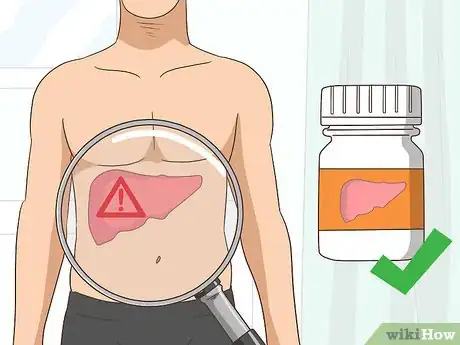
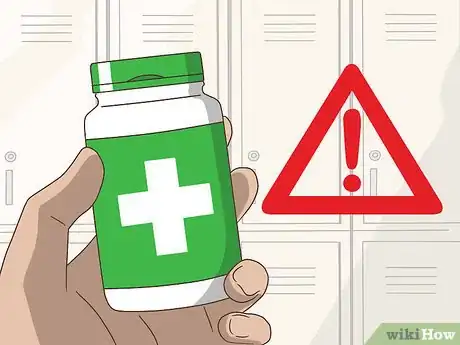
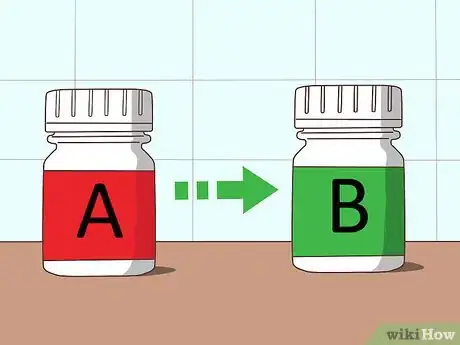
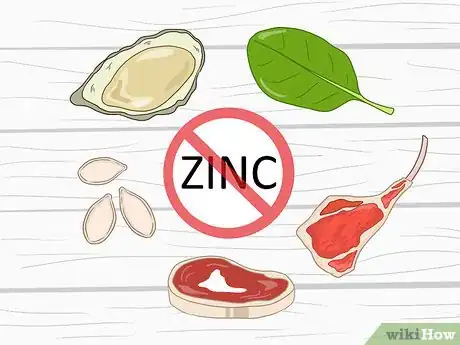
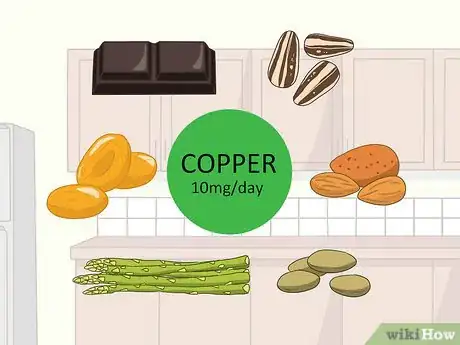
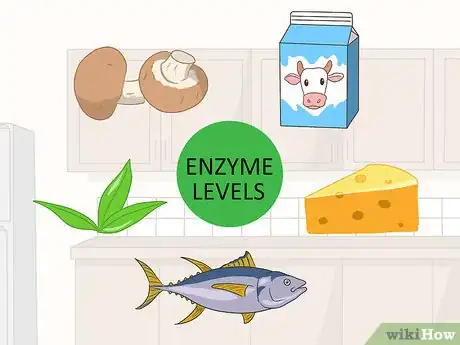






















-Step-16.webp)














































Medical Disclaimer
The content of this article is not intended to be a substitute for professional medical advice, examination, diagnosis, or treatment. You should always contact your doctor or other qualified healthcare professional before starting, changing, or stopping any kind of health treatment.
Read More...